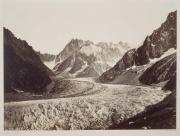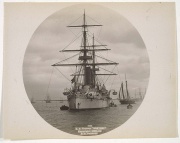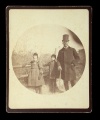Difference between revisions of "Albumen paper"
| (4 intermediate revisions by 3 users not shown) | |||
| Line 1: | Line 1: | ||
| − | [[File:1989.23-CR8208-d1.jpg|thumb| | + | [[File:1989.23-CR8208-d1.jpg|thumb|Mer de Glâce, Chamonix<br>MFA# 1989.23]] |
== Description == | == Description == | ||
A photographic [[printing out paper]] widely used from about 1850-1890. Albumen paper was invented by Louis Desiré Blanquart and presented to the French Academy of Sciences in 1850. Blanquart used a thin layer of egg white protein to disperse and bind photosensitive salts. Egg white was whipped then allowed to settle to a liquid; this formed a homogeneous liquid which was mixed with small amounts of salt (usually [[sodium chloride]] or [[ammonium chloride]]) and [[citric acid]], then spread as a thin layer over a high quality cellulosic paper. After drying, the layer was activated by treatment with [[silver nitrate]] to form [[silver chloride]], a light sensitive compound. To create an image, a negative was placed in direct contact with the paper, then exposed to daylight. Once the development was complete, it was stopped by treating the paper with a fixing agent such as [[sodium thiosulfate]]. Albumen prints were a golden to purplish brown color with a glossy surface. It was replaced in the 1890s by [[silver gelatin paper]]. | A photographic [[printing out paper]] widely used from about 1850-1890. Albumen paper was invented by Louis Desiré Blanquart and presented to the French Academy of Sciences in 1850. Blanquart used a thin layer of egg white protein to disperse and bind photosensitive salts. Egg white was whipped then allowed to settle to a liquid; this formed a homogeneous liquid which was mixed with small amounts of salt (usually [[sodium chloride]] or [[ammonium chloride]]) and [[citric acid]], then spread as a thin layer over a high quality cellulosic paper. After drying, the layer was activated by treatment with [[silver nitrate]] to form [[silver chloride]], a light sensitive compound. To create an image, a negative was placed in direct contact with the paper, then exposed to daylight. Once the development was complete, it was stopped by treating the paper with a fixing agent such as [[sodium thiosulfate]]. Albumen prints were a golden to purplish brown color with a glossy surface. It was replaced in the 1890s by [[silver gelatin paper]]. | ||
| − | [[File:1998.87-SC8649.jpg|thumb| | + | [[File:1998.87-SC8649.jpg|thumb|U.S. Cruiser "Boston"<br>MFA# 1998.87]] |
== Synonyms and Related Terms == | == Synonyms and Related Terms == | ||
albumen print; albumen photograph | albumen print; albumen photograph | ||
| − | |||
| − | |||
| − | |||
| − | |||
== Comparisons == | == Comparisons == | ||
| − | [[media: | + | [[media:download_file_476.pdf|Common Types of Paper]] |
| − | |||
| − | |||
== Additional Images == | == Additional Images == | ||
<gallery> | <gallery> | ||
| − | File:2002.621-SC53938.jpg| | + | File:2002.621-SC53938.jpg|Alfred, Lord Tennyson<br>MFA# 2002.621 |
File:Kodak_Albumen_overall.jpg|Albumen print | File:Kodak_Albumen_overall.jpg|Albumen print | ||
File:Kodak_Albumen_spec.jpg|Albumen print | File:Kodak_Albumen_spec.jpg|Albumen print | ||
| Line 34: | Line 28: | ||
</gallery> | </gallery> | ||
| + | ==Resources and Citations== | ||
| + | |||
| + | * James M. Reilly, The Albumen & Salted Paper Book: The history and practice of photographic printing, 1840-1895. Light Impressions Corporation. Rochester, 1980 | ||
| − | + | * Timothy Vitale, Paul Messier, "Physical and Mechanical Properties of Albumen Photographs" ''JAIC'' 33(3):279-99, 1994. | |
* E.J.LaBarre, ''Dictionary and Encyclopedia of Paper and Paper-making'', Swets & Zeitlinger, Amsterdam, 1969 Comment: dates of use = 1850-1890 | * E.J.LaBarre, ''Dictionary and Encyclopedia of Paper and Paper-making'', Swets & Zeitlinger, Amsterdam, 1969 Comment: dates of use = 1850-1890 | ||
| Line 45: | Line 42: | ||
* ''Caring for your Collections'', Arthur W Schulz (ed.), Harry N. Abrams, Inc. , New York, 1992 Comment: Debbie Hess Norris chapter; dates of use = 1855-1885 | * ''Caring for your Collections'', Arthur W Schulz (ed.), Harry N. Abrams, Inc. , New York, 1992 Comment: Debbie Hess Norris chapter; dates of use = 1855-1885 | ||
| − | * | + | * Preservation 101 [http://www.nedcc.org/p101cs/terms.htm Glossary of Terms] -invented in 1850 by Louis-Desire Blanquart-Evrard |
[[Category:Materials database]] | [[Category:Materials database]] | ||
Latest revision as of 09:20, 25 April 2022
Description
A photographic Printing out paper widely used from about 1850-1890. Albumen paper was invented by Louis Desiré Blanquart and presented to the French Academy of Sciences in 1850. Blanquart used a thin layer of egg white protein to disperse and bind photosensitive salts. Egg white was whipped then allowed to settle to a liquid; this formed a homogeneous liquid which was mixed with small amounts of salt (usually Sodium chloride or Ammonium chloride) and Citric acid, then spread as a thin layer over a high quality cellulosic paper. After drying, the layer was activated by treatment with Silver nitrate to form Silver chloride, a light sensitive compound. To create an image, a negative was placed in direct contact with the paper, then exposed to daylight. Once the development was complete, it was stopped by treating the paper with a fixing agent such as Sodium thiosulfate. Albumen prints were a golden to purplish brown color with a glossy surface. It was replaced in the 1890s by Silver gelatin paper.
Synonyms and Related Terms
albumen print; albumen photograph
Comparisons
Additional Images
Resources and Citations
- James M. Reilly, The Albumen & Salted Paper Book: The history and practice of photographic printing, 1840-1895. Light Impressions Corporation. Rochester, 1980
- Timothy Vitale, Paul Messier, "Physical and Mechanical Properties of Albumen Photographs" JAIC 33(3):279-99, 1994.
- E.J.LaBarre, Dictionary and Encyclopedia of Paper and Paper-making, Swets & Zeitlinger, Amsterdam, 1969 Comment: dates of use = 1850-1890
- The Dictionary of Art, Grove's Dictionaries Inc., New York, 1996 Comment: final date of use = 1895
- Luis Nadeau, Encyclopedia of Printing, Photographic, and Photomechanical Processes, Atelier, New Brunswick, 1997 Comment: Invented by Louis Desire Blanquart in the late 1840s and presented to the French Academy of Sciences on May 27, 1850.
- Caring for your Collections, Arthur W Schulz (ed.), Harry N. Abrams, Inc. , New York, 1992 Comment: Debbie Hess Norris chapter; dates of use = 1855-1885
- Preservation 101 Glossary of Terms -invented in 1850 by Louis-Desire Blanquart-Evrard










